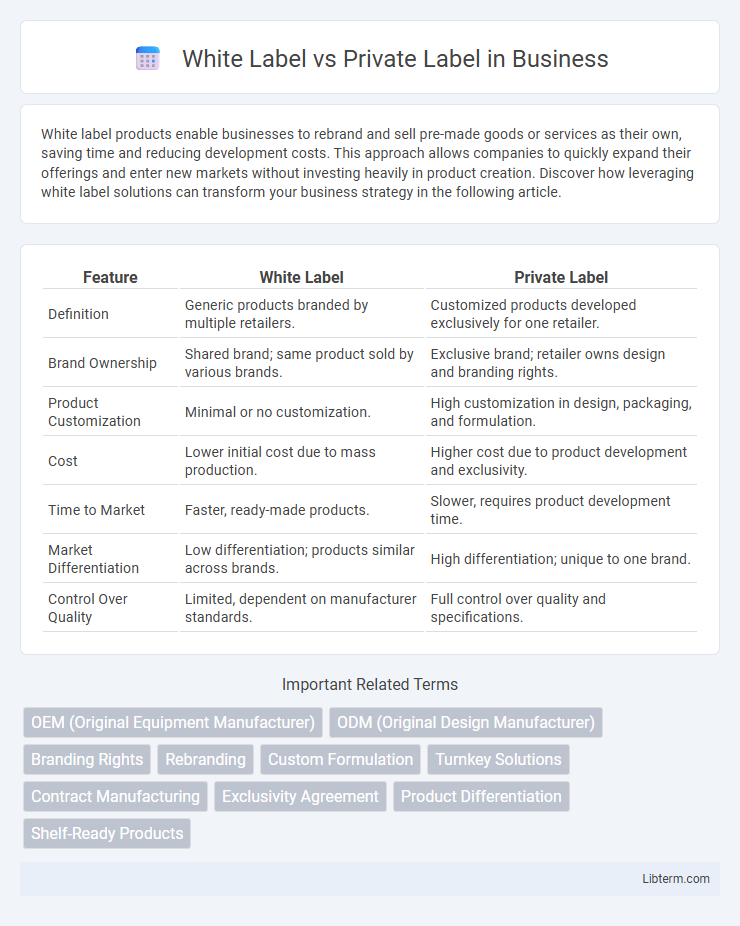White label products enable businesses to rebrand and sell pre-made goods or services as their own, saving time and reducing development costs. This approach allows companies to quickly expand their offerings and enter new markets without investing heavily in product creation. Discover how leveraging white label solutions can transform your business strategy in the following article.
Table of Comparison
| Feature | White Label | Private Label |
|---|---|---|
| Definition | Generic products branded by multiple retailers. | Customized products developed exclusively for one retailer. |
| Brand Ownership | Shared brand; same product sold by various brands. | Exclusive brand; retailer owns design and branding rights. |
| Product Customization | Minimal or no customization. | High customization in design, packaging, and formulation. |
| Cost | Lower initial cost due to mass production. | Higher cost due to product development and exclusivity. |
| Time to Market | Faster, ready-made products. | Slower, requires product development time. |
| Market Differentiation | Low differentiation; products similar across brands. | High differentiation; unique to one brand. |
| Control Over Quality | Limited, dependent on manufacturer standards. | Full control over quality and specifications. |
Introduction to White Label and Private Label
White Label products are manufactured by one company and rebranded by another for sale, offering ready-made solutions that simplify market entry. Private Label involves products created exclusively for a specific retailer or brand, allowing customization in design and formulation to build unique brand identity. Both models enable businesses to expand product offerings without investing heavily in manufacturing infrastructure.
Defining White Label: Concept and Benefits
White label products are manufactured by one company and rebranded by another to make it appear as their own, enabling businesses to quickly expand their product offerings without investing in production. The concept allows companies to leverage established manufacturing expertise and streamline marketing efforts while ensuring consistent quality. Benefits include cost efficiency, faster time-to-market, and the flexibility to customize branding to suit specific target audiences.
Defining Private Label: Concept and Advantages
Private label products are manufactured by one company and sold under another company's brand, allowing retailers to customize packaging and branding to differentiate from competitors. This strategy offers advantages such as higher profit margins, enhanced brand control, and increased customer loyalty through unique product offerings. Private label solutions enable businesses to respond quickly to market trends while maintaining quality standards and reducing production costs.
Key Differences Between White Label and Private Label
White label products are created by one company and rebranded by multiple retailers, allowing for minimal customization, while private label products are exclusively manufactured for a single retailer with unique branding and product specifications. White label typically involves generic products sold by many vendors under different brand names, whereas private label offers retailers greater control over product design, quality, and packaging. The key difference lies in ownership of intellectual property and customization: private label products grant retailers proprietary control, unlike white label items which are widely distributed.
Pros and Cons of White Label Products
White label products offer the advantage of quick market entry with lower development costs, allowing businesses to brand already-developed items and focus on marketing and sales. However, these products may lack uniqueness and control over quality or features, potentially leading to less differentiation and customer loyalty compared to private label options. Dependence on the manufacturer's production timeline and limitations in customization also pose challenges for companies seeking full brand identity control.
Pros and Cons of Private Label Products
Private label products offer businesses complete control over branding, quality, and pricing, enabling differentiation in competitive markets and fostering customer loyalty. They require higher upfront investment in product development, marketing, and inventory management compared to white label solutions, posing increased financial risk. Limited scalability and longer time to market are additional challenges, but private label products often yield higher profit margins and stronger brand recognition.
Suitable Industries for White Label Solutions
White label solutions are highly suitable for industries such as software, cosmetics, and food and beverage, where companies seek to quickly expand their product offerings without extensive R&D investment. E-commerce, SaaS platforms, and health and wellness sectors also benefit from white label products by leveraging established manufacturing and branding frameworks to streamline market entry. This approach allows businesses in these industries to enhance scalability, reduce costs, and maintain focus on marketing and customer acquisition.
Ideal Markets for Private Label Products
Ideal markets for private label products include niche sectors with less competition and high consumer loyalty, such as organic skincare, specialty foods, and customized pet supplies. These markets benefit from private label strategies because they allow retailers to tailor products to specific customer preferences, enhancing brand differentiation and consumer trust. Private labels thrive in emerging markets where consumers seek unique, affordable alternatives to established brands, driving rapid growth opportunities.
Factors to Consider When Choosing Between White Label and Private Label
Choosing between white label and private label products requires evaluating control over branding, customization options, and production costs. White label offers ready-made products with minimal customization, ideal for quick market entry and lower upfront investment, while private label permits unique product formulation and exclusive branding, demanding higher initial resources but potentially greater brand differentiation. Assessing target market expectations, budget constraints, and long-term business goals is crucial for selecting the optimal labeling strategy.
Conclusion: Which Model is Right for Your Business?
Choosing between white label and private label depends on your business's control preferences, brand identity goals, and budget constraints. White label products allow faster market entry with standardized offerings, while private label provides unique branding and customization but requires greater investment. Businesses prioritizing speed and lower risk often prefer white label, whereas those seeking differentiation and long-term brand equity lean toward private label solutions.
White Label Infographic

 libterm.com
libterm.com